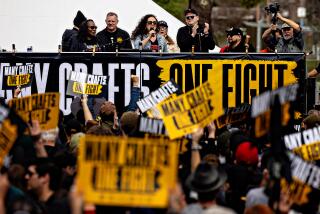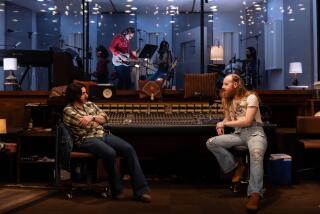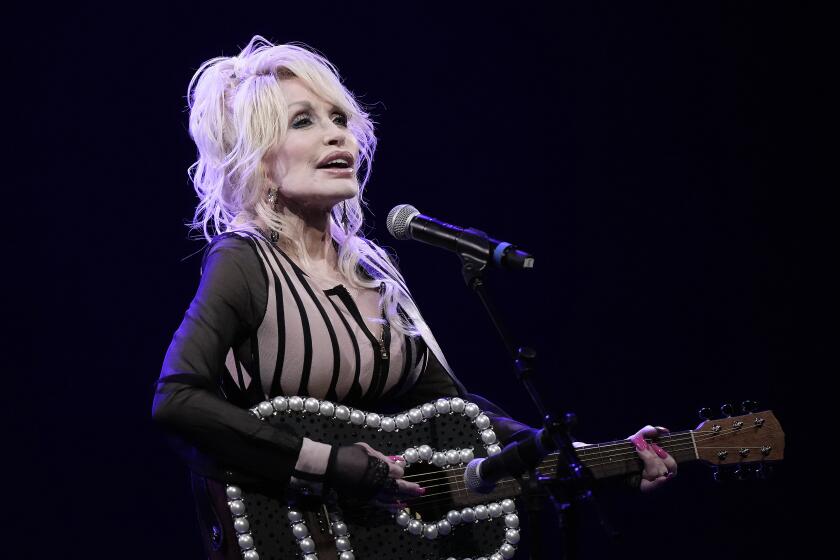Broadway Strike Turns Into Musical Showstopper
- Share via
NEW YORK — Theater musicians, supported by actors and stagehands, went on strike Friday, forcing the closure of virtually every Broadway musical for the weekend and disappointing thousands of ticket holders, many of them tourists.
The labor dispute, if prolonged, could be another setback for New York City’s struggling economy, still trying to recover from the post-Sept. 11 downturn and Wall Street woes. Broadway producers estimate that the Great White Way contributes $4.42 billion to the city’s economy.
“The last thing this economy needs is a Broadway strike,” Mayor Michael R. Bloomberg said. “People come here for the cultural institutions. Broadway is not only a significant part of it, it’s one of the most visible parts of it.”
The shutdown affected 18 musicals, including such lavish productions as “The Producers,” “42nd Street,” “Hairspray” and “Phantom of the Opera,” where tickets can cost $100.
Frustrated theatergoers stood in front of lobby box offices Friday as pickets, supervised by police, marched outside.
“We are pretty upset. We have two kids. It was their mom’s birthday. It was a surprise for her,” said Brian McQuillan, 40, a salesman from East Meadow, N.Y., in the lobby of the Lunt-Fontanne Theatre, home of “Beauty and the Beast.” “I guess our night is shot.”
Arlene Shriver stood in front of the same venue with her three grandchildren, Evan, 10, Rachel, 9, and Jessie, 7. They had flown in from Cleveland to see the musical, and the two girls were wearing new black skirts for their big evening.
A few minutes before the show was to have started, Rachel was in tears.
“Our option of coming back is zero,” Shriver said. “The money doesn’t mean as much as the disappointment. Look at all the children who are around.”
The walkout came in a dispute over the right of producers to limit the size of theater orchestras.
Some producers had planned to keep their shows running by using recorded music, but 2 1/2 hours before curtain time Friday night, officials of the unions representing actors and stagehands threw their support to the musicians, dashing producers’ hopes.
“Our members have made it clear that they do not wish to perform to virtual orchestras,” said Patrick Quinn, president of the Actors’ Equity Assn., at a crowded news conference. “Our members also believe that live music is essential on Broadway.”
The decision by the unions guaranteed that stages, except for that featuring “Cabaret,” which is covered by a separate contract, would remain dark. Nonmusical and off-Broadway plays were unaffected.
“They, unfortunately for theatergoers, have turned out the lights on Broadway,” said Jed Bernstein, head of the League of American Theatres and Producers, referring to the unions.
A spokesman for Local 802 of the American Federation of Musicians called the league’s decision to cancel the weekend’s shows “unfortunate” and said bargaining should have continued.
It was unclear when negotiations might resume. The last strike by Broadway musicians was in 1975, over the same issue, and lasted 25 days.
The dispute centers on the number of musicians who will play in theater orchestras. Minimums in large theaters range from 24 to 26 players. Producers complain that orchestra minimums saddle them with unnecessary costs: $88,000 in salary and benefits for each musician.
The walkout was not without its own dramatic elements. Scores of drummers, violinists, saxophonists and trumpeters carried picket signs under the neon lights of Broadway as tourists stopped to watch. Television crews bathed the picket line in lights as marquees advertised the closed shows.
“To knock down the minimums is to say goodbye to the orchestras. It’s just for the bucks,” said Glen Drewes, who plays trumpet in “Thoroughly Modern Millie” at the Marquis Theatre at Broadway and 46th Street. “They’re making huge profits. They want to make more. They want to squeeze everybody. They think the public won’t care.”
Lawrence Feldman, who plays the saxophone in the same orchestra, held up a hand-painted sign that read: “Virtual Millie. Thoroughly Awful.”
Some union officials predicted a short strike, and Alan Eisenberg, executive director of Actors’ Equity, expressed annoyance that the parties have been reluctant to accept mediation.
“I believe there is room for both sides. Both sides can reach an agreement,” he said. “Both sides said they had not made their final offer.”
Bloomberg offered the city’s services in an effort to reach a settlement. The mayor said city officials can act as a “facilitator.”
In a statement, Edward McConway, president of the Broadway local of the International Alliance of Theatrical Stage Employees, said that honoring the picket line “is good for the industry.”
“Even though we are concerned about the theatergoing public, the state of our industry and our city, we are a union, and union supports a union picket line,” he said. “It’s an issue of conscience.”
Officials of Actors’ Equity urged a quick settlement and indicated their union’s support could be reexamined.
“If the scenery changes, we might reevaluate,” Quinn said.
As he spoke at the union’s headquarters a few steps from the theater district, signs had been prepared for actors walking the picket lines.
“Save Live Music on Broadway,” the signs urged.
Broadway stalwart Bebe Neuwirth, who won a Tony Award in Bob Fosse’s “Sweet Charity,” appeared at the Actors’ Equity news conference along with Tony Award winner Harvey Fierstein, who is starring in “Hairspray.” Both expressed displeasure at taped music in theaters.
Neuwirth labeled the practice “insulting to an audience.”
Negotiations had been going on for more than a month. The labor contract expired Sunday, but talks continued.
After picketing began Friday, the League of American Theaters and Producers announced that ticket holders can exchange their tickets or receive refunds for canceled performances.
More to Read
The biggest entertainment stories
Get our big stories about Hollywood, film, television, music, arts, culture and more right in your inbox as soon as they publish.
You may occasionally receive promotional content from the Los Angeles Times.










